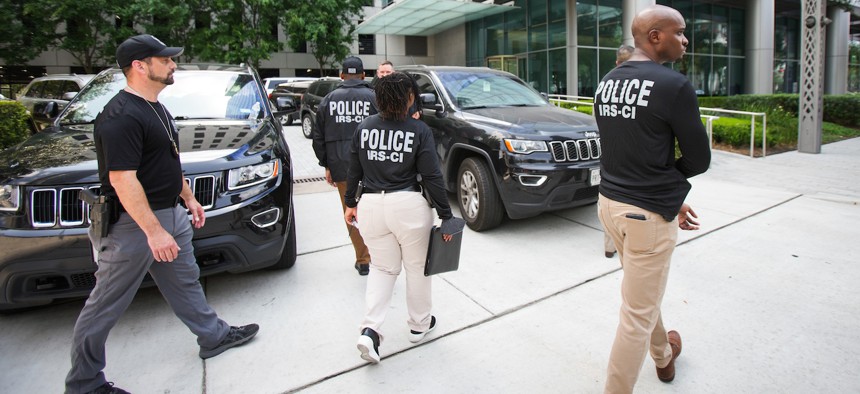
IRS agents walk toward a building in the Galleria area of Houston, where the agency conducted a court authorized investigation on a business on May 20, 2022. “Knocking on someone’s door today is a different scenario than it was 10 to 15 years ago,” IRS Commissioner said on Monday when he announced that revenue officers would no longer make surprise visits to taxpayers. Brett Coomer/Houston Chronicle via Getty Images
IRS announces the end of most surprise taxpayer visits
The change, effective immediately, comes due to concern for the safety of IRS employees and to make it easier for taxpayers to identify potential scammers.
The Internal Revenue Service announced Monday that it will no longer send its revenue officers on surprise visits to taxpayers’ homes and businesses, ending a decades-old practice for collecting overdue tax debts due to concerns about employee safety.
IRS Commissioner Danny Werfel announced the policy change, which is effective immediately, on a call with reporters Monday morning. Although the practice by which unarmed IRS employees visit taxpayers to collect outstanding tax debts or investigate the unexpected absence of tax return filings has been in place since the 1950s, Werfel said the Inflation Reduction Act gave the agency an opportunity to assess its continuing usefulness.
“We have ways of effectively collecting revenue owed to the government without knocking on doors,” Werfel said. “We are adding more staffing for compliance work, including revenue officers, to ensure fairness in tax enforcement, including targeting high income [tax delinquents].”
The change also addresses “longstanding” safety concerns, both on the behalf of agency employees, who have long been the targets of Republican rhetoric, as well as taxpayers leery of potential scammers.
“I’m still in the early stages of my term at the IRS, but what I’m hearing from employees is a concern they have shared that over the last five to 10 years, the dynamic has changed when you knock on someone’s door or ring their doorbell,” he said. “I don’t know if that’s unique or specific to the IRS, but knocking on someone’s door today is a different scenario than it was 10 to 15 years ago, and there have been significant reports from employees of home visits where they have felt unsafe. We have also heard concerns from taxpayers, who expressed concerns because we’ve been articulating over and over to be on the lookout for people posing as IRS employees. The result has been a lot of confusion.”
In a statement, National Treasury Employees Union National President Tony Reardon, whose union represents IRS workers, lauded the policy change.
“There is nothing more important than keeping our federal employees safe on the job, which is why we commend IRS leadership for this decision halting all unannounced taxpayer visits,” Reardon said. “The revenue officers we represent will continue to efficiently and effectively carry out their mission of helping taxpayers meet their lawful tax obligations through other means of communication.”
Moving forward, instead of making a surprise house call, IRS revenue officers, who are civil enforcement officials and are unarmed, will mail potentially delinquent taxpayers a letter asking them to schedule an appointment with the IRS to discuss their case. Unannounced visits now will only occur in cases where the IRS must serve a taxpayer with a summons or subpoena, or through enforcement activities such as the seizure of assets.
“Those instances will be a drop in the bucket, compared to the past policy,” Werfel said. “We’re talking about a few hundred cases each year, a small fraction of the tens of thousands of unannounced visits that occurred annual under the old policy.”
In instances where a taxpayer continually ignores IRS revenue officers’ attempts to set up a meeting, Werfel said that still would not necessarily lead to a surprise visit.
“All of this [new process] is now outlined at the IRS website, but when we get toward a set of processes where a taxpayer is not responding, you start to get into a situation where a levy or a lien becomes applicable,” he said. “And they can also be done remotely . . . It’s also important to understand the context of revenue officer work. Revenue officers work on substantial cases—the median debt a revenue officer is seeking to recover is $110,000. This is also, I think, important to understand: these home visits were not occurring for a small tax debt, it’s a big tax debt, and now that we aren’t doing unannounced visits it’s important to continue our compliance efforts.”







